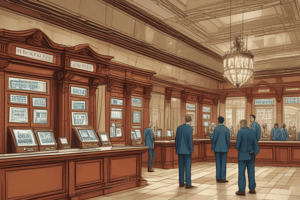Podcast
Questions and Answers
What is a retail bank?
What is a retail bank?
- A bank that charges high fees.
- A government-owned bank.
- A bank that only offers loans.
- A financial institution that allows everyday people to deposit their money. (correct)
What percentage of Americans have their money on deposit with banks according to the Federal Reserve?
What percentage of Americans have their money on deposit with banks according to the Federal Reserve?
90%
What does accessibility mean in the context of banking?
What does accessibility mean in the context of banking?
Money in most types of bank accounts is as easy to get as if it were in your piggy bank.
What is liquidity in finance?
What is liquidity in finance?
What does security from loss, theft, and disaster refer to in banking?
What does security from loss, theft, and disaster refer to in banking?
What is the Federal Deposit Insurance Corporation (FDIC)?
What is the Federal Deposit Insurance Corporation (FDIC)?
Banks pay depositors interest as a form of guaranteed growth.
Banks pay depositors interest as a form of guaranteed growth.
What do credit unions operate as?
What do credit unions operate as?
What are checking accounts characterized by?
What are checking accounts characterized by?
What is the purpose of savings accounts?
What is the purpose of savings accounts?
What do certificates of deposit (CDs) require?
What do certificates of deposit (CDs) require?
What are rent-to-own programs?
What are rent-to-own programs?
What are check-cashing outlets known for?
What are check-cashing outlets known for?
What does direct deposit refer to?
What does direct deposit refer to?
What is an automatic teller machine (ATM)?
What is an automatic teller machine (ATM)?
Smart cards are often referred to as electronic wallets.
Smart cards are often referred to as electronic wallets.
Flashcards are hidden until you start studying
Study Notes
Retail Banking Overview
- Retail banks, also known as commercial banks, serve everyday individuals by facilitating deposits and providing various financial services.
- 90% of Americans keep their money deposited in banks, highlighting the central role of banks in personal finance.
Key Banking Concepts
- Accessibility: Funds in bank accounts are readily accessible, akin to having cash on hand.
- Liquidity: Indicates how easily investments can be converted into cash, an important aspect of managing finances.
- Security: Storing money in retail banks protects against loss or theft better than carrying cash personally.
Insurance and Regulatory Bodies
- The Federal Deposit Insurance Corporation (FDIC) guarantees bank deposits up to $250,000, providing peace of mind in case of bank failures.
- National Credit Union Administration (NCUA) ensures deposits in credit unions, similar to the FDIC for banks.
Types of Financial Institutions
- Credit Unions: Non-profit institutions owned by members with shared interests, often offering higher interest rates on savings.
- Savings and Loan Associations: Focus on savings accounts and loans, insured by the FDIC and may operate similarly to credit unions.
- Online Banks: Operate exclusively online, allowing account management through digital platforms.
Banking Account Types
- Checking Accounts: Most liquid account type, enabling cash access through checks and ATMs but generally do not earn interest.
- Savings Accounts: Intended for savings, funds are not accessible via checks or debit cards.
- Money Market Deposit Accounts: Blend features of savings and checking accounts, often providing higher interest rates.
- Certificates of Deposit (CDs): Require larger deposits and penalize early withdrawals before maturity.
Alternative Financial Services
- Pawn Shops: Provide loans secured by tangible assets, charging high interest rates.
- Rent-to-Own Programs: Allow purchases of items through installment payments that often exceed retail prices.
- Check-Cashing Outlets: Charge significant fees for cashing checks, with rates sometimes reaching 2-3%.
Tax and Payment Services
- Rapid-Refund Tax Services: Offer quick tax refunds in exchange for high-interest loans, with rates up to 120%.
- Check-Deferral Services: Provide advance cash on paychecks but come with steep costs—$200 advances may exceed $30 in fees.
Endorsement Types
- Blank Endorsement: Makes a check cashable by anyone.
- Restrictive Endorsement: Offers more security than a blank endorsement, limiting the use of the check.
- Special Endorsement: Transfers the check to another party.
Bank Statement Reconciliation
- Steps for reconciling a bank statement include obtaining the current balance, adding recorded deposits, subtracting outstanding checks, and comparing the result with the check register balance.
Convenient Banking Features
- Direct Deposit: Automatically deposits earnings or government payments into bank accounts, saving effort and time.
- Automatic Payments: Facilitates recurring bill payments through direct bank withdrawals.
- ATMs: Provide cash access and banking transactions; some ATMs offer additional services like bill payments and sales of transport passes.
- Point-of-Sale Transactions: Allow payments using debit cards at retail establishments.
- Stored-Value Cards: Prepaid cards for specific services like transit fares or school lunches.
- Electronic Cash: Development of digital versions of traditional payment methods.
- Smart Cards: Advanced cards resembling ATM cards with embedded microchips for enhanced security and functionality.
Studying That Suits You
Use AI to generate personalized quizzes and flashcards to suit your learning preferences.




